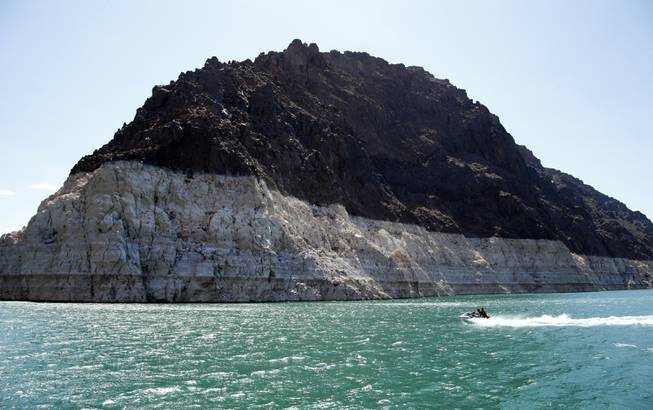
John Locher / AP
In this July 17, 2014, photo, recreational boaters ride by a bathtub ring that delineates the high water mark at Lake Mead.
Published Monday, Jan. 25, 2016 | 2 a.m.
Updated Monday, Jan. 25, 2016 | 8:51 a.m.
The water level in Lake Mead has dropped to historic lows, forcing the construction of a third straw at the bottom of Las Vegas’ reservoir. Gov. Brian Sandoval’s panel of experts issued a report that recommended more aggressive water-saving plans.
If you follow the headlines, it looks as if water in Las Vegas is in dire straits.
But while the challenges are great, Southern Nevada may be rising to meet them.
On Jan. 29, the UNLV Boyd School of Law will host a conference on water law titled “Turbulent Waters: Brokering a Secure World.” Held in conjunction with the Saltman Center for Conflict Resolution, the Desert Research Institute and the Brookings Institution, the conference will feature speakers discussing climate science, national security and resource management. It’s one of two conferences policymakers have dubbed the “Week of Water.”
The conference will include presentations and panel discussions with Pat Mulroy, former general manager of the Southern Nevada Water Authority; Michael Connor, deputy secretary of the U.S. Department of the Interior; Steve Hill, executive director of the Governor’s Office of Economic Development; and general managers from the Southern Nevada and Truckee Meadows water authorities. The conference also will include a screening of clips from “Thirsty Land,” a documentary about water and agriculture.
“No one has brought together the different disciplines involved — education, law, economic development and regulation,” said Mulroy, now a senior fellow at the Brookings Institution. “We have an opportunity to do that.”
Nevada is ideally situated to become a global leader in business, governance and research about water, Mulroy said.
In addition to the UNLV conference, the Las Vegas Chapter of the Jewish National Fund will conduct a water summit Feb. 3 at the Stan Fulton Building at UNLV that will include a panel discussion with Mulroy, water scientists, entrepreneurs and policymakers. The meeting’s keynote speaker is Seth Siegel, author of “Let There Be Water: Israel’s Solution for a Water-Starved World.”
Officials in Nevada already have made connections with water experts in Singapore, Finland, England and Israel. It’s natural for the American Southwest to look to the Middle East for answers about water, said David Siegel, the Israeli consul general in Los Angeles.
“We’ve managed to create a separation between climate and growth,” Siegel said. “You can live in the desert and develop. That’s the whole story of Israel. We’ve proven that we can solve it.”
Israel handles its water differently than the United States does. And there’s a single national water authority rather than a jumble of local agencies. There is no legal doctrine of prior appropriation rights for water, meaning agriculture, industry and residents pay market price for every drop they use. Israel also has desalination plants along its coast to turn saltwater into fresh water, advanced irrigation, recycling technology and a conservation culture.
Although most experts say changing water-rights law in the United States would be a nonstarter, much of what Israel does could be adapted here. Nevada hopes to be central to the changes.
Editor’s note: This story has been revised to correct an error about the location of the Jewish National Fund summit.

Join the Discussion:
Check this out for a full explanation of our conversion to the LiveFyre commenting system and instructions on how to sign up for an account.
Full comments policy